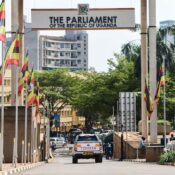
Uruguay’s leftist presidential candidate says he will prioritize growth over tax increases
The front-runner in surveys ahead of this month’s elections, Yamandu Orsi, a center-left candidate for president of Uruguay, intends to avoid unpopular tax increases despite a widening deficit in favor of accelerating economic growth in the farming nation.
The 57-year-old former regional mayor downplayed concerns that his government would attempt to increase tax collection by raising levies on the wealthy or on businesses, which some believe would harm the nation’s reputation as an investor-friendly destination, in his first interview with foreign media prior to the first-round vote on October 27.
In the capital city of Montevideo, the candidate for the left-leaning Broad Front coalition told Reuters, “I don’t see the need to increase taxes.” In the election on October 27, Orsi will face Alvaro Delgado, the candidate of the ruling conservative coalition.
“What is necessary is growth and to make the economy grow.”
Although it slowed last year, economic growth in the 3.4 million-person, relatively rich farming nation is expected to resume in 2024. It has consistently reported fiscal deficits, which analysts believe must be addressed by any incoming administration.
According to economist Maria Dolores Benavente of Uruguay, “the current account deficit has worsened over the past year.” “That indicator is the only Achilles’ heel Uruguay has.”
According to a report published in October by investment bank J.P. Morgan, the incoming government would have to implement “structural reforms” in order to keep the fiscal deficit from growing.
But Orsi said he would not give in to the pressure.
He claimed that increasing taxes and reducing state employment were not the best ways to address the deficit. He added that his government would instead seek to increase growth through technological innovation, luring in investment, and upskilling workers.
The former history instructor also hinted that he may halt the current conservative government’s push for a free-trade agreement with China in favor of agreements through the Mercosur trading bloc and Brazil, a massive neighbor.
He remarked, “We must always work to be within the limit of what Mercosur allows us, without going beyond it,” alluding to the group that consists of Brazil, Argentina, and other neighboring nations called Mercosur. Separating from the bloc, he argued, would be “absurd” and “unrealistic.”
However, he said that China, Uruguay’s biggest trading partner, would always be welcome to invest. “Let’s not forget that the Chinese have the Belt and Road proposal, that is very useful to us,” he said, alluding to China’s plan to build land and sea networks to link Asia with Europe and Africa.
Luis Lacalle Pou, the current president of Uruguay, has exacerbated tensions with other Mercosur members by proposing trade agreements outside the bloc. Mercosur’s detractors claim it prevents Uruguay from increasing its exports of goods like soybeans and meat. Although Uruguay’s constitution prohibits leaders from running for immediate reelection, Lacalle Pou is nonetheless well-liked.
According to the most recent Uruguayan election polls, Orsi is marginally ahead of center-right National Party candidate Delgado for the vote on October 27, although the polls also suggest that a runoff election is inevitable. November would be the date of that.
Orsi, who has gained support from legendary socialist former president Jose “Pepe” Mujica, has angered some Uruguayans with his conflicting opinions about Venezuelan President Nicolas Maduro, who has been under increasing fire following a contentious election in July.
Orsi described Maduro’s government as a “authoritarian regime” and told Reuters that the July election was “more than suspicious” and lacked democratic legitimacy. He did not, however, rule out asking Maduro to attend his inauguration in the event that he wins.
“When the time comes, we’ll see who is invited and who isn’t,” he stated. “These things have to be considered.”
All Categories
Recent Posts
Tags
+13162306000
zoneyetu@yahoo.com



